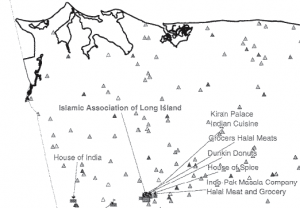Close, But No Cigar: NYPD within 3 Miles of Faisal Shahzad’s Hawala, Missed It
 On April 10, 2010, Mohammad Younis, of Centereach, NY, met with Faisal Shahzad at the Ronkonkoma train station and gave him $7,000 in cash. That money went to buy fertilizer, propane, and gasoline that Shahzad used to build a bomb he tried to set off in Times Square three weeks later–the last real Islamic terrorist attack launched on New York City.
On April 10, 2010, Mohammad Younis, of Centereach, NY, met with Faisal Shahzad at the Ronkonkoma train station and gave him $7,000 in cash. That money went to buy fertilizer, propane, and gasoline that Shahzad used to build a bomb he tried to set off in Times Square three weeks later–the last real Islamic terrorist attack launched on New York City.
I was particularly interested to see the NYPD’s intelligence profile of Suffolk County released by the AP this morning. As I noted last year, the NYPD’s extensive intelligence programs failed to identify the two most significant attacks on NY in recent history: those attempted by Najibullah Zazi and Shahzad.
With Zazi, that failure was epic; the NYPD used his imam as an informant, and actually tipped Zazi off to the investigation.
But Shahzad’s attack would have been harder to find. He plotted the attack from Connecticut–outside the city, though well within the range of the NYPD’s intelligence efforts. The one lead squarely within the NYPD’s profiling activities, though, would have been the hawala Shahzad used–Younis’ hawala–to get money from Pakistan.
It turns out the NYPD’s profiling efforts got within 3 miles of Younis’ house. They profiled his house of worship, the Islamic Association of Long Island. They profiled about 10 businesses in his community–though they focused on the halal restaurants, not the 7-11 where Younis used to work or the Lowes where he worked at the time he met with Shahzad. They also profiled a mosque and an auto repair shop in Ronkonkoma, the town where Shahzad met with Younis.
They never found Younis or his hawala activities, which he did not operate for profit.
Mind you, even if they had profiled the 7-11 or the Lowes, they still wouldn’t have found anything. Younis himself had no knowledge of Shahzad’s plot (Younis plead guilty to one count of unlicensed money remitting and was sentenced to three years of probation in December).
Which all goes to show that even profiling the precise neighborhoods through which terrorist money flows will not–did not–serve to discover or prevent attacks.


But they did find a Dunkin Donuts.
@Strangely Enough: They’re cops! They appear to have included Dunkin Donuts in all these profiles.
Go figure.
I hope you keep this up. I would love to see this get wider play because it is absolutely essential to understand how misguided this program was. It was worse than a crime, it was a blunder, as the saying goes. It was counter-productive to the intended goal and a huge waste of money.
A perfect illustration of trying to find a needle in the haystack by adding more hay.
A question, of course, is:
Was this course misguided from the onset?
Now it seems obvious.
I’m not condoning or condemning. I have had instances myself, after finding out the truth, I go: WTF! Followed by a red face!